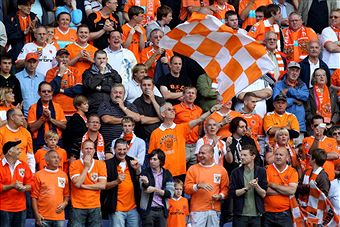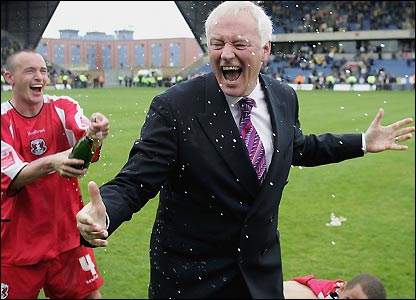This Premier League season may well prove to be a seminal one. Not on who wins it, or who qualifies for that modern Holy Grail the Champions League, but marking the moment when the Premier League, in effect, created Premier League Two.
Creating a second division in the Premier League has always been talked about, particularly by the smaller clubs fearful of relegation, but the idea has never found favour in the rest of the Premiership. Yet this will be the effect of the money that the Premier League is now going to give to clubs who get relegated from the Premiership.
The so called parachute payments which start this season are of such an order that not only will they soften the fall, but act like a boomerang, creating a small coterie of clubs who, having tasted Premiership football, will be favoured to bounce right back. These clubs will earn the sort of money their rivals in the Championship cannot and create a gap between them and their rivals similar to the one that exists between Premier League clubs that qualify for the Champions League proper and those that do not. In other words, it will establish an upper tier of the Championship which, in all but name, will become Premier League Division Two.
Consider, for instance, Blackpool.
Now in theory this is the story that proves that romance in football is not dead. With gates of around 8,000 they should have had no realistic hopes of getting into the Premiership. But they did and not only that, but for a few brief hours on the first Saturday of the Premier League season, stood top of the League with that incredible victory over Wigan, another reel of the romance saga.
 Forced to play their home match at Wigan they still managed to deliver a 4-0 thrashing to Wigan. For all the talk of money and greed, surely this proves that the club that gave us the great romantic story of the last century in the Stanley Mathews Cup Final can still do it.
Forced to play their home match at Wigan they still managed to deliver a 4-0 thrashing to Wigan. For all the talk of money and greed, surely this proves that the club that gave us the great romantic story of the last century in the Stanley Mathews Cup Final can still do it.
Yet in the hard world of football finance and image rights that we live in what will ultimately matter to Blackpool is being part of the Premier League money pool.
Like Manchester United, who timed their return to form beautifully, winning their first League Championship since the Busby days with the inaugural Premier League in 1992, Blackpool could not have timed their entry into the big time better.
Just look at the money they will make. They will get around £30 million ($46.5 million) for just being in the Premiership this season. Then, even if they are relegated, they will get parachute payments over the next four seasons totalling £48 million ($74.5 million) and £16 million ($248.8 million) for the first two, and £8 million ($12.4 million) for the next two. So in other words, that one great playoff victory at Wembley means a bonanza of nearly £80 million ($124.2 million) spread over five years.
If you then consider that a Champions Club gets just over £2.5 million ($3.8 million) a year, a League One club around £600,000 (£931,920) and a League Two club around £400,000 ($621,280), you can see the immense disparity in wealth this will create.
Of course money does not buy success, ask Real Madrid, but having such spending power means that Blackpool, even if they go down, will be better able to keep its structure intact and bounce back. And over time this will mean that a small group of clubs, enriched by Premier League money, will sit on top of the Championship every year and keep going back and forth from the Premiership.
The new payments from the Premier League recognise that. From this season there will even be “spare” parachute payments. This will cover clubs that, having been relegated, bounce back straightaway. Depending on whether this is one club or three it could range from an extra £11.2 million ($17.3 million) to £22.4 million ($34.7 million) a season.
Even before this season the need for spare parachutes was emphasised by the way West Bromwich Albion kept bouncing back from the Championships. I suspect Wolves, which has both history and pedigree, even if it is in the distant past, will come into this category
To appreciate this best, look back at the first Premier League table, the 1992-93 season. The clubs that featured then included Norwich (which finished third), QPR (fifth) and Sheffield Wednesday (seventh), incidentally all finishing higher than Arsenal, Chelsea, Tottenham or Manchester City. Wimbledon came 12th and the League also included Ipswich, Sheffield United, Coventry City, Southampton, Leeds and Oldham, and the bottom three that year were Crystal Palace, Middlesbrough and Nottingham Forest.
In the years since then Bradford, Barnsley, Charlton, and Swindon Town have figured and while some of them like Ipswich, QPR, Sheffield United and Middlesbrough may hope to make a come back, at least one, Wimbledon, does not exist in the form it did, and many of the others can have no realistic chances of making it back.
The Premier League has dressed these increased parachute payments with its much trumpeted solidarity package worth, it says, in excess of £90 million ($139.7 million) over the next three seasons. This includes £5.4 million ($8.3 million) per season for Football League Youth Development; £4 million ($6.2 million) per season for Football League clubs’ community investment; £11.2 million ($17.3 million) per season solidarity payment to split amongst clubs in the Championship, League One and League Two.
 While the Football League accepted these payments, the realists in the League recognise how the old order has changed. None more so than Barry Hearn (pictured) of Leyton Orient. “Let us,” he told me, “face facts. Last year, all 72 clubs in the Football League lost money.
While the Football League accepted these payments, the realists in the League recognise how the old order has changed. None more so than Barry Hearn (pictured) of Leyton Orient. “Let us,” he told me, “face facts. Last year, all 72 clubs in the Football League lost money.
“When you fall from the Premiership it is a big fall. Look at Charlton, which nourished dreams of qualifying for Europe; they are now struggling in League One.
“By these new payments the Premiership is in effect creating a cartel. That was the reason the League One and Two clubs initially opposed the plan. But then the Premiership offered more money and brought in solidarity payments.
“While this does mean money trickling down the League, the gap between the Premiership and the rest remains. And the level of parachute payments means a club which has tasted the Premiership once will find it easier to get back. It may not be called Premier League Two, but that is still what it is creating. Blackpool is an exception to this nevertheless what this does is further cement the non-competitive structure of English football. And that has come about as a direct result of the rise of the Premier League.”
The Premier League is an intricate story of evolution and incremental change. This one will be longer lasting and more far reaching for the game than almost any previous change.
Mihir Bose is one of the world’s most astute observers on politics in sport and, particularly, football. He formerly wrote for The Sunday Times and The Daily Telegraph and until recently was the BBC’s head sports editor.

.jpg)